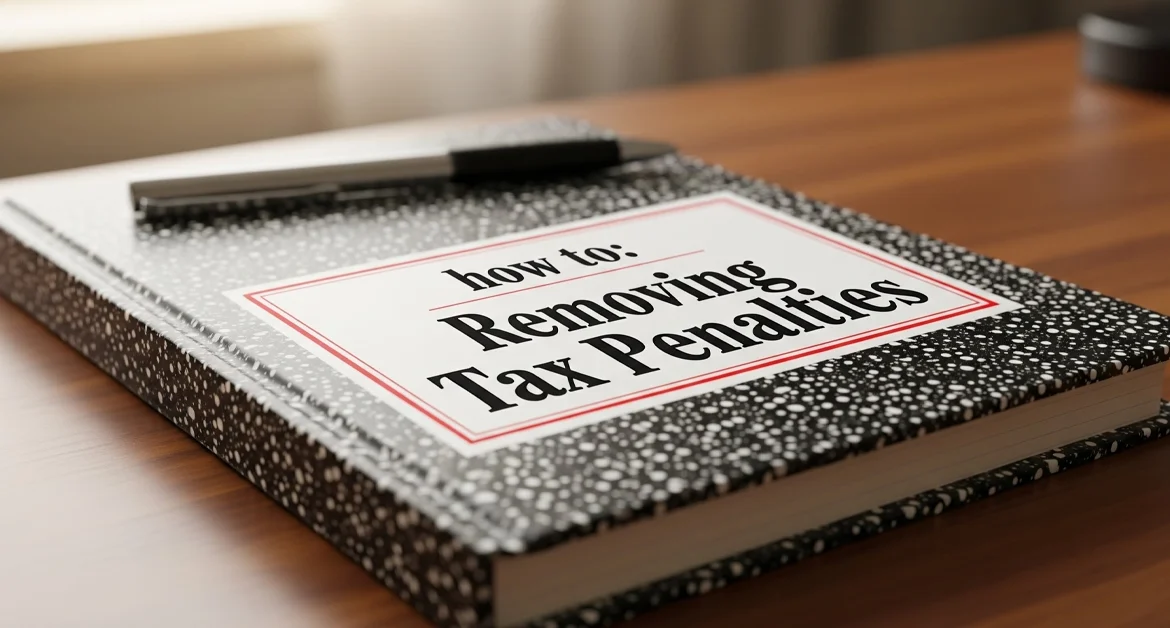Penalty Abatement FAQs
Can the IRS remove penalties on my tax debt?
Yes. The IRS offers several paths to penalty relief, including First-Time Penalty Abatement (FTA), Reasonable Cause, and limited statutory/administrative exceptions. FTA generally applies when you have a clean 3-year history, all required returns are filed, and you’ve paid or set up an approved payment plan. If FTA doesn’t fit, you can request Reasonable Cause by documenting circumstances beyond your control and submitting a clear statement (often with Form 843).
Can IRS interest charges be reduced or waived?
Usually no. Interest accrues daily until the balance is paid. The main exceptions: (1) interest tied to a penalty that is abated will be reduced accordingly, and (2) interest may be abated when it resulted from an IRS error or unreasonable delay under IRC §6404(e). Otherwise, your best strategy is to reduce principal and penalties and enter a payment plan to limit future accruals.
How do I request penalty abatement—phone or Form 843?
Try calling first (the number on your IRS notice). Agents often screen for FTA on the spot. If relief isn’t approved by phone, submit Form 843, Claim for Refund and Request for Abatement with a concise, dated statement and supporting documents. Include the notice, tax period, penalty types, evidence (e.g., medical/disaster records), and proof of corrective action (filed return, payment, or installment agreement).
What should a strong Reasonable Cause letter include?
Keep it factual and documented: (1) what happened (dates, facts, why you couldn’t comply), (2) how you exercised ordinary business care and prudence, (3) what you did to fix it as soon as possible, and (4) the exact relief requested (which penalties and period). Attach evidence (e.g., hospital records, insurance/police reports, correspondence).
Will a payment plan help with penalties and interest?
A payment plan doesn’t stop interest, but it can lower the Failure-to-Pay rate (often to 0.25% per month for individuals in an approved agreement) and prevents enforcement while you pursue abatement. It’s a practical way to reduce total costs while your request is reviewed.
Why Penalties and Interest Snowball
When a balance goes unpaid, the IRS can add multiple charges that compound quickly:
- Failure-to-File (FTF): generally 5% per month (or part of a month) the return is late, up to 25%. If FTF and Failure-to-Pay (FTP) apply in the same month, the combined charge for that month is coordinated so you don’t get hit with the full 5% twice.
- Failure-to-Pay (FTP): generally 0.5% per month (or part of a month) after the due date; it may drop to 0.25% while you’re in an approved installment agreement, and increase to 1% if you ignore a levy notice.
- Accuracy-related penalties (often 20%) and civil fraud (up to 75%) may apply in exam situations (not the focus here).
- Interest accrues daily on unpaid tax and on penalties until the balance is paid. With limited exceptions, interest can’t be “forgiven.”
The good news: penalties are often negotiable. The IRS has defined pathways to reduce or remove them. Interest is harder (see below), but can shrink when penalties are abated because interest tied to those penalties is adjusted.
Can IRS penalties be removed?
Yes. The IRS recognizes three primary avenues:
- First-Time Penalty Abatement (FTA) – an administrative waiver for otherwise compliant taxpayers.
- Reasonable Cause – you exercised ordinary business care and prudence but couldn’t comply due to circumstances beyond your control.
- Statutory/administrative exceptions – e.g., incorrect IRS written advice or certain IRS errors.
You can request relief by phone (sometimes granted on the spot) or in writing (often using Form 843). The IRS’s own guidance explains these pathways and when each applies.
First-Time Penalty Abatement (FTA)
What it covers: FTF, FTP, and Failure-to-Deposit (for payroll) penalties for a single tax period. (It does not cover accuracy or fraud penalties.)
Who qualifies (high level):
- Clean history for the prior 3 years (no significant penalties for FTF/FTP/FTD).
- All required returns are filed (or valid extensions).
- Tax due is paid or you’re in an approved payment plan.
How to request:
- Call the number on your notice (agents often check FTA eligibility first).
- Or file Form 843, Claim for Refund and Request for Abatement (attach your notice and a brief explanation).
Pro tip: If you ask for reasonable cause by phone but the IRS determines you qualify for FTA, they’ll apply FTA instead (it’s faster). If relief can’t be approved by phone, submit Form 843 in writing.
Reasonable Cause penalty abatement
If FTA doesn’t fit, you may still qualify for reasonable cause. The core test: you acted with ordinary business care and prudence, but external circumstances prevented timely filing or payment. The IRS cites reasons such as serious illness, death in the immediate family, natural disasters, records destroyed, or other significant, documented hardships.
How to make a strong case:
- Be specific: dates, facts, and the chain of events (what happened, when, and why it made compliance impossible).
- Show prudence: what steps you took to comply or to fix things fast once you could.
- Provide evidence: hospital records, insurance claims, police/fire reports, affidavits, or correspondence.
- Ask for the exact relief: e.g., “Please abate the failure-to-file and failure-to-pay penalties for Tax Year 2023.”
You can request reasonable cause by phone (sometimes granted) or in writing using Form 843.
Note: Relying on a paid preparer to file on time is not generally reasonable cause for late filing under court precedent; focus your letter on the underlying circumstance, not delegation alone.
Statutory exceptions and IRS errors
Two less common—but powerful—relief routes:
- Incorrect written advice from the IRS: If you relied on erroneous written guidance from the IRS for your specific situation and can document it, penalties may be removed. (Attach the IRS writing and your reliance.) IRS
Interest/penalties caused by IRS error or delay: Under IRC §6404, the IRS can abate interest attributable to unreasonable error or delay in performing a ministerial or managerial act. This is narrow—general administrative slowdowns don’t qualify—but if it applies, it’s a key exception.
What about interest? (Reducing IRS interest charges)
Bottom line: Interest keeps running until you pay, and the IRS almost never abates interest just because it’s burdensome. You may see interest adjusted only when:
- The underlying penalty is abated (so interest tied to that penalty is reduced/removed), or
- There was an IRS error/unreasonable delay under §6404(e).
Practical strategy: Focus on penalty relief first (FTA or reasonable cause), then reduce principal (payment plan or settlement). That combination shrinks the base on which interest accrues and speeds resolution.
How to apply: step-by-step
You can pursue relief by phone or in writing. A clean, documented written request is often best for reasonable cause or when phone attempts fail.
Option A — Call (fastest)
- Call the number on your IRS notice.
- Ask the agent to screen for FTA and, if not eligible, consider reasonable cause based on your facts.
- Keep notes (date, time, agent name/ID, decisions). If not approved, proceed with a written request. IRS
Option B — File Form 843
- Download Form 843 and its instructions
- Indicate the tax period and penalty type(s).
- Attach your supporting statement (see letter template below) and evidence.
Mail to the address shown on your notice (or in the instructions) and retain proof of mailing.
Reasonable Cause Penalty Abatement letter template (use and adapt)
Subject: Request for Penalty Abatement – [Tax Year], [Your Name & SSN (last 4)]
- Who I am & what I’m requesting
I’m requesting abatement of Failure-to-File and Failure-to-Pay penalties for Tax Year [YYYY]. - Facts & timeline (specific dates)
On [date], [describe the event: serious illness, hospitalization, disaster, records loss, etc.]. This prevented me from filing/paying on time. I acted with ordinary business care and prudence by [explain steps: requested records, extended return, contacted IRS, etc.]. As soon as I was able, I filed on [date] and paid/entered an installment agreement on [date]. - Why this meets reasonable cause
The circumstances were beyond my control and directly caused the delay. I have enclosed documentation (e.g., medical records/insurance claim/police report/correspondence). - What I’m asking for
Please abate the FTF and FTP penalties for Tax Year [YYYY] and adjust related interest as appropriate.
Signature
Enclosures (list your evidence)
(Submit with Form 843 if filing by mail.)
Choosing the right path (quick decision guide)
- Never had penalties and generally compliant? Start with FTA.
- Serious life event or uncontrollable circumstance? Build a reasonable cause request with evidence.
- IRS gave wrong written advice / made a qualifying error or delay? Explore statutory exception or interest abatement under §6404(e).
- Cash-flow constrained? Combine relief with a payment plan—it reduces the FTP rate while you pay (and stops active collection).
Payment plans and why they matter (even while seeking relief)
An Installment Agreement does more than buy time.
While it won’t stop interest, it reduces the Failure-to-Pay rate to 0.25% per month for individuals with approved plans—materially slowing new penalties while your abatement request is reviewed.
If you ignore levy notices, that rate can jump to 1%, which is the opposite of what you want—so get into a plan early if you can.
You can apply online (if eligible) or by submitting the official request; details are on IRS.gov and in the Form 843/penalty relief guidance referenced above.
Documentation checklist (what to include)
Common pitfalls to avoid
- Your notice (CP/Letter with the penalty described).
- Timeline of events (dates you intended to file/pay; what intervened).
- Evidence: hospitalization or medical records; disaster reports; insurance or police reports; employer letters; affidavits; correspondence showing you tried to comply.
- Proof of corrective action: filed returns, payment confirmations, installment agreement approval, or settlement paperwork.
- Form 843 (if mailing) and your signed statement (see template above)
- Waiting too long: Interest keeps accruing daily; penalties can stack to statutory limits. Get into some arrangement quickly (even a small plan) while you pursue abatement.
- Vague letters: “I had difficulties” won’t cut it—be specific, dated, and documented.
- Asking to abate interest alone: Unless tied to IRS error/delay or to abated penalties, interest will keep running.
- Assuming phone relief is guaranteed: If a call doesn’t resolve it, submit Form 843 with evidence.
How this ties into IRS seizures & garnishments (our recent mini-series)
Penalties and interest can inflate balances to the point that taxpayers fear more serious collection. In our four-part series, we explained how the IRS may act if debts remain unresolved:
- Property risk: Can the IRS Take My House or Car if I Owe Back Taxes?
- Income risk: Can the IRS Garnish My Wages or Paycheck?
- Benefit risk: Can the IRS Garnish My Social Security or Disability Income?
- Retirement risk: Can the IRS Garnish My Pension or Retirement Accounts for Back Taxes?
This pillar addresses the root cost problem: remove what’s removable (penalties), control what isn’t (interest) with a plan, and keep your case out of the seizure/garnishment zone.
Key Takeaways
- Penalties are negotiable via First-Time Abate, Reasonable Cause, or statutory/administrative exceptions.
- Interest nearly always keeps accruing daily; it’s only abated for IRS error/delay or when penalties are removed.
- File a focused request: try the phone first; if needed, submit Form 843 with a dated, documented letter.
- Use a payment plan to reduce the FTP rate while you pursue relief and to prevent collections from escalating.
Final thought
You don’t have to live with spiraling penalties.
Use FTA if you qualify; build a reasonable-cause case if you don’t. Get into a payment plan to stop the bleeding, and keep your file out of levy territory.
If your situation is complex—or if you’ve hit a wall—bring in a professional to frame the facts and finish the job.


